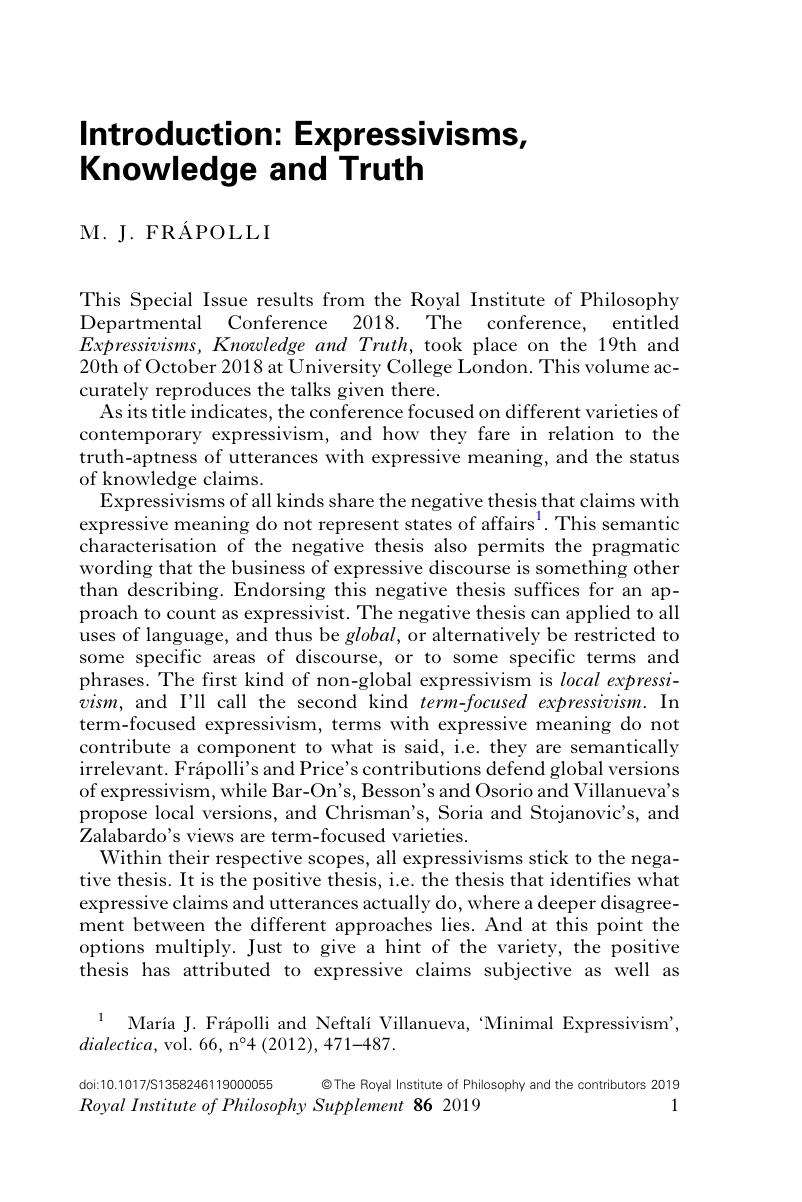No CrossRef data available.
Published online by Cambridge University Press: 18 September 2019

1 Frápolli, María J. and Villanueva, Neftalí, ‘Minimal Expressivism’, dialectica, vol. 66, n°4 (2012), 471–487CrossRefGoogle Scholar.
2 Stevenson, C. L., ‘The Emotive Meaning of Ethical Terms’, Mind, 46 (181) (1937), 14–31CrossRefGoogle Scholar; Ayer, Alfred J., Language, Truth and Logic (London: Penguin Books, 1936)Google Scholar.
3 Blackburn, Simon, Essays in Quasi-Realism (Oxford: Oxford University Press, 1993)Google Scholar.
4 Chrisman, Matthew, ‘From Epistemic Contextualism to Epistemic Expressivism’, Philosophical Studies, 135 (2) (2007), 225–254CrossRefGoogle Scholar; Chrisman, Matthew, ‘Epistemic Expressivism’, Philosophy Compass, 7(2) (2012), 118–126CrossRefGoogle Scholar; Field, Hartry, ‘Epistemology without Metaphysics’, Philosophical Studies, 143 (2) (2009), 249–290CrossRefGoogle Scholar; Field, Hartry, ‘Epistemology from an Evaluativist Perspective’, Philosophers’ Imprint, 18 (2018)Google Scholar.
5 Price, Huw, Expressivism, Pragmatism and Representationalism (Cambridge: Cambridge University Press, 2013), 30CrossRefGoogle Scholar.
6 Barker, Stephen J., Global Expressivism (Nottingham: Nottingham ePrints, University of Nottingham, 2007)Google Scholar; Brandom, Robert, Articulating Reasons. An Introduction to Inferentialism (Cambridge, Mass.: Harvard University Press, 2000)Google Scholar; Gibbard, Alan, Meaning and Normativity (Oxford: Oxford University Press, 2012)CrossRefGoogle Scholar; Huw Price, op. cit., note 5; Schroeder, Mark, Being For: Evaluating the Semantic Program of Expressivism (Oxford: Oxford University Press, 2008)CrossRefGoogle Scholar.
7 Recall Wittgenstein's remarks on logical constants: ‘My fundamental thought is that the “logical constants” do not represent. That the logic of the facts cannot be represented’, Ludwig Wittgenstein, Tractatus Logico-Philosophicus, (London: Routledge, 1922/2014), 4.0312.
8 Frege, Gottlob, ‘Begriffsschrift, a formula language, modelled upon that of arithmetic, for pure thought’, in van Heijenoort, Jean, From Frege to Gödel. A Source Book in Mathematical Logic, 1879–1931 (Cambridge, Mass.: Harvard University Press, 2002), 1– 82Google Scholar, section 5.
9 Ramsey, Frank P., ‘General Propositions and Causality’, in Ramsey, Frank P., Philosophical Papers, edited by Mellor, D. H. (Cambridge: Cambridge University Press, 1990), 145– 63Google Scholar.
10 Ryle, Gilbert, The Concept of Mind (London: Routledge, 1949)Google Scholar, 104ff.
11 Robert Brandom, op. cit., note 6; Brandom, Robert, Between Saying and Doing. Towards and Analytic Pragmatism (Oxford: Oxford University Press, 2008)CrossRefGoogle Scholar; María J. Frápolli and Neftalí Villanueva, op. cit., note 1.
12 I am deeply grateful to all of them for their participation in the workshop that gave rise to this volume, as well as for their contributions to it.
13 Bar-On, Dorit and Chrisman, Matthew, ‘Ethical Neo-Expressivism’, in Shafer-Landau, R., (ed.), Oxford Studies in Metaethics, volume 4, Oxford University Press, 2011, 132–165Google Scholar.
14 Chrisman, Matthew, The Meaning of ‘Ought’ (New York: Oxford University Press, 2016)Google Scholar.
15 Millgram, Elijah, The Great Endarkenment: Philosophy for an Age of Hyperspecialization (New York: Oxford University Press, 2015)Google Scholar.
16 McGrath, Sarah, ‘Relax? Don't Do It! Why Moral Realism Won't Come Cheap’, Oxford Studies in Metaethics, volume 9 (2014), 186–214CrossRefGoogle Scholar.